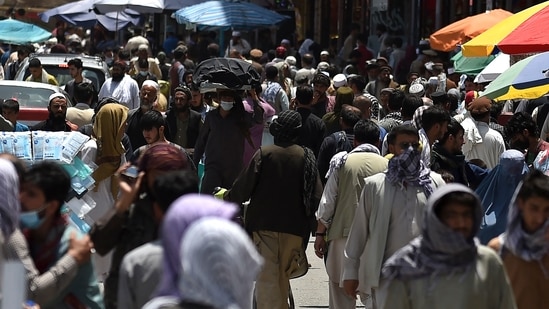Kabul will fall to Taliban after US leaves: Intel
The warning comes at a time there is growing international concern about terror outfit Taliban making gains in Afganistan.
US intelligence has warned that Kabul, the capital of Afghanistan, will fall to the resurgent Taliban within six months of the departure of the last of US and international troops, the Wall Street Journal reported on Wednesday, days ahead of a White House meeting between President Joe Biden and top Afghan leaders Ashraf Ghani and Abdullah Abdullah.

The warning comes at a time there is growing international concern about terror outfit Taliban making gains in Afganistan since May 1, when the US and allied troops began leaving the country in accordance with a timeline announced by President Joe Biden for complete withdrawal by September 11 this year -- the 20th anniversary of the 9/11 terror attacks that brought on the invasion of Afghanistan.
India, which is a key stakeholder in Afghan reconciliation and reconstruction, called for a UN-led “permanent and comprehensive ceasefire” in Afghanistan during a UN Security Council debate on Monday, pointing specifically to the sudden escalation in violence since May 1, to “ensure immediate reduction in violence and protection of civilian lives”.
The Journal report said that US intelligence experts had earlier assessed that the government of President Ghani would survive for two years after the US withdrawal. This timeline was based roughly on the time it took for the fall of Saigon in Vietnam after US withdrawal in 1975.
US intelligence and military analysts have since revised their assessment and now believe that Kabul could fall in six to 12 months after the departure of American troops, the Journal reported, adding that officials in other western countries have a far worse assessment of three months.
US military has planned to wound up the withdrawal process by as soon as July, going down from the 3,500 troopers currently still there to zero, barring a small force left behind for the protection of American diplomatic missions and officials.
“I will say that while, in general, we are seeing elevated attacks on ANDSF (Afghan National Defense and Security Forces) and Afghan government versus a year ago, we have not seen an increase in attacks on our military presence since February 2020,” White House press secretary Jen Psaki said on Wednesdayin response to a question about the rapid military gains posted by the Taliban.
“We also assess that, had we not begun to draw down, violence would have increased against us as well after May 1, because that was what the Taliban was clearly conveying. So, the status quo, in our view, was not an option,” she said.
American lawmakers are also worried by Taliban’s advances and sought assurances from US defense secretary Lloyd Austin and chairman of the joint chiefs of staff General Mark A Milley at a congressional hearing on Wednesday.
Milley said, “Yes, we’re concerned we’re watching it, but there’s a 300,000 plus or minus, military force” of the Afghanistan army and the police “and it is their job to defend their country”. The Taliban control 81 of the country’s 419 district centres, but not any of the provincial capitals yet ,he added.
Secretary Austin sought to address concerns expressed by lawmakers about the US’s ability to prevent Afghanistan from sliding back under the control of terrorists after the withdrawal, saying America has a “very” effective over-the-horizon capability in keeping an eye on Afghanistan, currently from partner countries in the Gulf and platforms at sea, but they are from a distance.
“What we’d like to do going forward is shorten the legs that were required to utilise by getting an agreement with one of the neighbouring countries to base some of our ISR (Intelligence, Surveillance, Reconnaissance) in one of those countries,” he said at the congressional hearing.
Austin did not name these countries, but Pakistan may have been a leading candidate, as has been clear from repeated public protestations from Prime Minister Imran Khan, who first said that Pakistan will “absolutely not” agree to give US bases and expounded his reasons for doing so in an Oped in the Washington Post on Monday.
Asked about Khan’s declarations, a State Department spokesperson told Hindustan Times, “As President Biden said, the United States will reorganise our counterterrorism capabilities and substantial assets to prevent reemergence of terrorist threats, in Afghanistan or anywhere else.
The United States respects the sovereignty of other nations and their ability to make decisions about what is in the best interest of their national security.”
Central Asian countries such as Tajikistan, Uzbekistan and Kyrgyzstan are considered to be among the other candidates because of their shared boundaries with Afghanistan — US had bases there once, people familiar with the region said, adding that Russian President Vladimir Putin’s blessings might be a problem.
Afghan President Ghani, who begins a visit to Washington on Thursday, has been pressing the Taliban to accept a role in some sort of interim unity government until elections can be held.
But the insurgents, emboldened by their battlefield gains since May 1, appear to have little interest in further negotiation and are intent on taking full control and restoring Afghanistan to an emirate ruled by religious elders.
They have recently issued several statements about how they would govern -- broadly outlined, but light on detail. And peace talks between the Taliban and the Afghan government remain stalled.
New Delhi, too, has raised growing concerns over the recent surge in violence across Afghanistan, with external affairs minister S Jaishankar last month expressing unease about the withdrawal plan for “political expediency”.
(With inputs from agencies)
Get Current Updates on India News, Lok Sabha election 2024 live, Election 2024 along with Latest News and Top Headlines from India and around the world.



